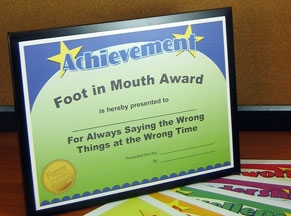
Thank you so much! Just click the link…
Reboot your job search. Reset your career.

Thank you so much! Just click the link…
 If you think you are not in jeopardy of losing your job, think again. According to a survey by outplacement firm Lee Hecht Harrison, 50% of professionals laid off were caught unaware by the shocking news that they had been downsized.
If you think you are not in jeopardy of losing your job, think again. According to a survey by outplacement firm Lee Hecht Harrison, 50% of professionals laid off were caught unaware by the shocking news that they had been downsized.
Luckily, you can learn to become an outstanding networker, and grow your own safety net now, before you need it. Follow the 4 Golden Rules for Networking:
1) “Givers gain.” Help people, and they in turn will want to help you. Focus on others and look for opportunities to help them without worrying what is in it for you. When you focus on yourself and your needs, it can show. It is often easier (and more fun) to zero in on helping other by sharing information and assistance. People remember who helped them when they needed it.
2) Don’t confuse “great” networking with “effective” networking. Everyone knows a “great” networker—they seem to know everyone! However, knowing people and being effective in helping others build their business are not the same thing. Effective networkers deliver business results. It’s not simply knowing a lot of people, it is about being able to build productive links that benefit more than one person, and doing it consistently. 
3) Be sincere. Nothing is worse than a person who offers help in order to get something in return. People can sense when they are being used. This is why it is easier to build a network before you need one; then you can be genuine in your willingness to help others without needing anything in return immediately. Even if you need help, make the effort to find out how you can reciprocate; even offering to give assistance or be a resource in the future counts. Also, make the effort to formally say “thank you” to those who helped, and provide ongoing updates or results with an additional thanks.
4) Commit to spending the energy. Networks do not suddenly appear. Networks are built on relationships and shared experiences, so they need attention, time and nurturing to blossom. It is very challenging to network on a schedule or on a deadline, or when in crisis.
Networking before you “need” to do it is a stress-reducer. You are more relaxed and helpful to others, and that comes across in your demeanor and sincerity. Relaxed networking is also more likely to result in unexpected opportunities for advancement, participation, and current business windfalls. It’s just smart business.
 Local and regional career and employment fairs can streamline your job hunt, let you practice interviewing skills, and easily allow you to conduct research on career opportunities and companies.
Local and regional career and employment fairs can streamline your job hunt, let you practice interviewing skills, and easily allow you to conduct research on career opportunities and companies.
Like many job-searching techniques when there are many candidates for a few jobs, job fairs often don’t turn directly into job offers. However, if you are smart you can learn to transform a job fair into an eventual job offer.
As you’ll see in Step 3, it’s what you do after the job after that can really make a difference in results.
STEP 1: HOMEWORK
Many job seekers visit a job fair “to see what’s out there.” Wrong. Prepare for a fair as if it is a personal interview. That means upfront research. Know what companies are there. Be ready to ask intelligent questions about the specific job, not the company because you should already know that from pre-show research.
Carry a portfolio with laser-printed, professionally-prepared resumes. Dress professionally and simply. Don’t bring bulky bags. Keep your right hand free to shake hands.
STEP 2: YOUR PLAN OF ATTACK: WORKING THE JOB FAIR
Watch from afar, and pick who you are going to speak with at the booth. Approach the company representative, offer your hand and introduce yourself. Tell them you are interested in working for them, and why. Ask about their hiring process. Ask how to get an interview. Ask the names of the decision maker or head of the department (very important). 
Get business cards from people you meet (very important). Don’t overstay your welcome, but communicate your qualifications and your interest level. Ask what would help you get the job.
Importantly, target companies and get information about them even if (especially if) they don’t have an advertised opening in your area of expertise.
STEP 3: POST-FAIR JOB-WINNING TRICKS
Now you have names of HR managers, names of all the “decision makers”/department heads, and a good understanding of what the companies need.
Send resumes to department heads at each company, with a personalized letter summarizing qualifications for that specific job, your interest in it, and a willingness to meet. Copy the HR managers met. Do not expect them to contact you, so promise to follow up. And do it.
Follow the same tactic for companies that do not have advertised openings. You know they are hiring, which is a good economic benchmark. You have met someone who works there. By approaching the hiring manager of the department where you could contribute, you will have zero competition. It works!
Diane just accepted a new job as a Regional Vice President after a 5-month job search. She was unexpectedly laid off after 15 years at her current company.
She starts her new job in 3 weeks. However before she starts she will keep her plans to complete 4 previously-scheduled networking and interview lunches and meetings.
Why bother when she already has a job offer she has accepted?
 Workplace Coaching Advice: Five Things Never to Say at Work
Workplace Coaching Advice: Five Things Never to Say at Work
Alan Axelrod, PhD, a learning and communications consultant, was interviewed by Bottom Line Magazine. Five thoughts NEVER to share at work, according to Dr. Axelrod, are:
1) Looks like I’m working late again!
(Don’t be perceived as a complainer!)
2) I’ll get to it when I can.
(Don’t question the priorities of your superiors!)
3) I can do it better alone.
(Don’t be perceived as a poor team player!)
4) I did it.
(Don’t boast that you did it alone when most successful efforts are team efforts!)
5)The way I’ve always done it works just fine.
(Don’t be viewed as someone who resists change!)
We often don’t realize that other people’s impressions of us, even if untrue or unfair or distorted, impact their working relationship with us. In a workplace, these impressions often travel quickly around the office and up the chain–especially if they are negative. These thoughts listed here, while they all could be quite accurate in how you feel, need to be reworded so they aren’t misunderstood and interpreted as they are shown below each one.
For example, “I’ll get to it when I can” conveys an air of being bothered by a request; that one is too busy to do this, and it is an imposition. Better variations might include, “Right now I am swamped, but I am putting it on my list as the very next thing.” Same outcome–you aren’t going to do it right away, but the requester will feel more respected. Another tactic would be to simply get more information about when the information is needed and why. Again, it many not change the outcome of when you do it, but shows that you have an interest and for the right reason may either find an alternative or make a change.
 There’s an old story about a woman who was unhappy in her job. She was browsing through the local Sunday paper and she saw a large Help Wanted ad. Intrigued by the job title, she read further, getting more excited by each line of the job description. “That sounds perfect for me!,” she thought.
There’s an old story about a woman who was unhappy in her job. She was browsing through the local Sunday paper and she saw a large Help Wanted ad. Intrigued by the job title, she read further, getting more excited by each line of the job description. “That sounds perfect for me!,” she thought.
While she hadn’t been looking for a job, this was too good to pass up. Every single quality matched up perfectly with her experience. Except the part about being part of a dynamic team of friendly people. Her current job was filled with incompetent idiots with strange ideas, who seemed to try and sabotage her leadership.
She grabbed a pen and paper and dashed off a cover letter. “Odd,” she mused. “They don’t give the name of the company or the address, just a post office box address in a neighboring town.” Off went her letter and resume. She waited.
One day, she was called into the big boss’s office and laid off. “We heard through the grapevine you’ve been out looking for a job.” She gasped. She had only sent that one resume and cover letter. She had applied for her own job.
1) Don’t apply for your own job!
If you are employed, be very careful about putting your resume and cover letter “out there.” It can be very hard to remove it once it is released, and current management could come across an old posting and assume you are out looking for a new job. Get a post office box or use a friend’s address. Consider developing an alias or pseudonym: Beyonce famously used “Sasha Fierce” as her alter ego. Just the name itself is freeing, isn’t it? Perhaps you could use a nickname, middle name, initials only,a maiden name, or a previous family surname. Be sure to note on there that you aren’t using your real name because you are currently employed and need that privacy.
Add to the profile the information that you are currently happily employed but believe in continuously improving yourself and developing networks. That would make any current boss happy should they stumble upon your listing. You also don’t have to list the exact company names. Consider “A small boutique architectural firm with sales of $10 million” instead of listing the company name.
2) Safety and security at all times.
There are creeps out there. Identity theft, stalking, home robberies when people are on vacation; avoid putting anything perosnally identyfing in cyberspace. If you work in retail, you basically advertising when your home is empty. If you are posting about being at a conference, then again, your home is empty. Company information, birthdates, college graduation dates are also among things that can be used to start an identity theft profile.
3) Keep your private and professional lives separate.
There is a lot of pressure, and frankly, bad advice to only have one social media account, one email, one blog etc. Of course there are always exceptions, especially if your name is your brand.
Consider bucking the trend and the advice and keeping everything separate, but still knowing that nothing is really private anymore. Clients, customers, and future employers can find your personal Facebook postings and tweets if they want to. Your mother-in-law, next-door neighbor, and the PTA president can track your professional career if they desire and put in the effort. Here’s a guideline for every single thing you put out on the Internet or anywhere in cyberspace. If you are comfortable with these 3 factors you are good to post!
Copyright © 2024 · Log in